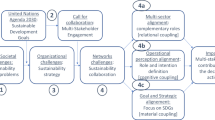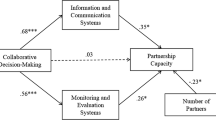Abstract
Achieving sustainability requires profound changes in both our consumption patterns and present methods of production. Making production and consumption systems sustainable, however, implies the involvement and support of many stakeholders. Today, it is widely supported that changes necessary on the level of systems require the involvement of all the main societal groups including governments, companies, public interest groups, the public and research bodies (e.g. Vergragt and Jansen, 1993; Weaver et. al., 2000). However, involvement alone is not sufficient as each societal group should actively contribute to the necessary changes within their specific roles and possibilities. Clearly, one societal group or a single stakeholder cannot carry out all necessary activities, as it commonly requires co-ordination and co-operation among and between social actors and stakeholders. Co-operation can take the form of concrete partnerships and alliances, while for instance, Roome (2001) emphasises the role of environmental networks of stakeholders that work together based on a shared vision.
Access this chapter
Tax calculation will be finalised at checkout
Purchases are for personal use only
Preview
Unable to display preview. Download preview PDF.
Similar content being viewed by others
References
Coenen, L. (2000) DTO Illustratieprocessen, wordt vervolgd 2 (STD Illustration processes, to be continued….?) Report DTO-KOV01 1 (in Dutch), Delft: STD-office.
Ehrlich, P.R., J.P. Holdren (1974) Impact of population growth, Science 171: 1212 – 1217.
Green, K., Ph. Vergragt (2001) Towards Sustainable Households: a methodology for developing sustainable technological and social innovations,paper at the 9th International Conference of the Greening of Industry Network, Bangkok January 21–25.
Green, K., J. Quist, K. Szita Toth, L. Toth and W. Young (1999) Scenarios for Shopping, Cooking and Eating in 2050: a three-country study,paper at the 8th International Conference of the Greening of Industry Network Conference, Chapel Hill.
Green, K., W. Young (2000) The Shopping, Cooking and Eating Function, Final Report, SusHouse Project, Manchester: School of Management, UMIST, Delft: Delft University of Technology, TBM Faculty.
Manzini, E., F. Jégou (2000) The Construction of Design Orienting Scenarios, Final Report, SusHouse project, Politecnico di Milano University, Interdepartmental Research Centre, Innovation for the Environmental Sustainability — Department of Industrial Design (CIR.IS-DI-Tec), Delft: Delft University of Technology, TBM Faculty.
Quist, J, K. Szita Toth and K. Green (1998), Shopping, Cooking and Eating in the Sustainable Household, paper at the 7th International Conference of the Greening of Industry Network, November 15–18; Rome.
Quist, J., M. Knot, W. Young, K. Green, P. Vergragt (2001) Strategies Towards Sustainable Households Using Stakeholder Workshops and Scenarios. Int. Journal Sustainable Development 4, 1: 75 – 89.
Quist, J., C. Pacchi, M. Van der Wel (2000) Workshop Organisation and Stakeholder Management, Final Report, SusHouse Project, Delft University of Technology, Technology Assessment Group (Nl)/Avanzi, Milano ( I ), Delft: Delft University of Technology, TBM Faculty.
Quist, J. (2000) Towards Sustainable Shopping, Cooking and Eating in the Netherlands, Final Report, SusHouse Project, Delft: Delft University of Technology, TBM Faculty.
Roome, N. (2001) Editorial — Conceptualizing and Studying the Contribution of Networks in Environmental Management and Sustainable Development, Business Strategy and the Environments’ Special Issue Networks, Environmental Management and Sustainable Development, 10, 2: 69 – 76.
Tansey, G., T. Worsley (1995) The Food System. London: Earthscan.
Tóth, K.S., L. Tóth, Z. Szekeres, L. Szííts, Z. Galbâcs, J. Fenyvessy (2000) Shopping, Cooking and Eating, Hungary, Final Report, SusHouse Project, Szeged University College of Food Industry, Department of Food Technology and Environmental Management, Delft: Delft University of Technology, TBM Faculty.
Van Gaasbeek, A., M.J. Meeusen-Van Onna, G. Wiersma, K.J. Kanuninga, H.C. Moll (2000) Consument, Voeding, Milieu — final report, DTO-report no. KOV015, Delft: programme for Sustainable Technological Development.
Vergragt, P., M. Van der Wel (1998) Back-casting: An Example of Sustainable Washing, in Sustainable Strategies for Industry, N. Roome ed. 171 – 184, Washington DC: Island Press.
Vergragt, P. (1999) The Sustainable Household: Technological and Cultural Changes, Proceedings of the 1999 International Sustainable Development Research Conference: March 25–26, Leeds, UK. Shipley, ERP Environment 276 – 381.
Vergragt, P.J., L. Jansen (1993) Sustainable Technological Development: the making of a long-term oriented technology programme, Project Appraisal 1993; 8 (3): 134 – 140.
Vergragt, Ph. (2000) Strategies towards the Sustainable Household, Final Report, SusHouse project, Delft University of Technology, Department of Industrial Design, Design for Sustainability Group, Delft: Delft University of Technology, TBM Faculty.
Weaver, P., L. Jansen, G. Van Grootveld, E. Van Spiegel, P. Vergragt (2000) Sustainable Technology Development Sheffield: Greenleaf Publishers.
Young, W., J. Quist, K. Toth, K. Anderson, K. Green (2001) Exploring Sustainable Futures through `Design Orienting Scenarios’: the case of Shopping, Cooking and Eating, Journal of Sustainable Product Design (accepted for publication).
Young, W. (2000) Shopping, Cooking and Eating, the United Kingdom, Final Report, SusHouse Project, Manchester School of Management, UMIST, Delft: Delft University of Technology, TBM Faculty.
Young, W., J. Quist and K. Green (2000) Strategies for Sustainable Shopping, Cooking and Eating 2050 — Suitable for Europe? Proceedings of the 2000 International Sustainable Development Research Conference: 2000 April 13–14, Leeds, UK. Shipley, ERP Environment, pp. 430 – 437.
Editor information
Editors and Affiliations
Rights and permissions
Copyright information
© 2002 Springer Science+Business Media Dordrecht
About this chapter
Cite this chapter
Quist, J., Green, K., Tóth, K.S., Young, W. (2002). Stakeholder Involvement and Alliances for Sustainable Households. In: de Bruijn, T.J.N.M., Tukker, A. (eds) Partnership and Leadership. Eco-Efficiency in Industry and Science, vol 8. Springer, Dordrecht. https://doi.org/10.1007/978-94-017-2545-3_15
Download citation
DOI: https://doi.org/10.1007/978-94-017-2545-3_15
Publisher Name: Springer, Dordrecht
Print ISBN: 978-90-481-5938-3
Online ISBN: 978-94-017-2545-3
eBook Packages: Springer Book Archive




